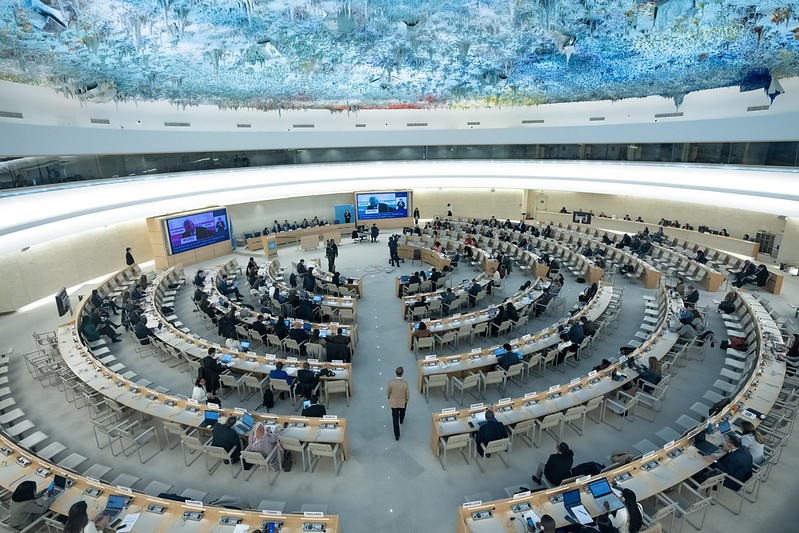(19 July 2023 – Geneva) Autocratic governments in the MENA region and beyond banded together at the 53rd session (19 June- 14 July) of the United Nations Human Rights Council (the Council) to push through a resolution on “Religious Hatred” that attempts to insert highly repressive language into the international human rights framework that threatens basic rights to freedom of religion and belief and freedom of expression. While CIHRS condemns all forms of discrimination and violence against individuals and groups based on religion or belief, such language further threatens already vulnerable religious minorities in countries around the world.
The move comes in the wake of growing international impunity for grave rights violations, including war crimes and crimes against humanity, being carried out by many governments. In recent years two major international investigations – on Yemen and on Libya – have been disbanded by the Council despite strong calls by UN expertsand civil society, including at an event this session, to preserve international investigations into ongoing serious violations. UN member states have also failed to follow up on joint declarations delivered at the Council on persistently oppressive human rights situations in Egypt and Saudi Arabia.
According to Jeremie Smith, Director of th e Geneva Office of the Cairo Institute for Human Rights Studies (CIHRS), “Autocratic governments in the MENA region and around the world have been emboldened by the international community’s refusal to ensure accountability for brutal crackdowns and widespread atrocities. These governments now appear determined to tear down universal human rights standards through the guise of protecting religion.”
A letter sent by NGOs from around the world to UN member states urged states to reject the resolution as it “fuels division and religious intolerance by shutting down interfaith dialogue, and can facilitate and legitimise horrifying human rights violations against religious minorities.” Speaking before the Council, CIHRS highlighted that members of religious minorities across several MENA countries are regularly subjected to repression and widespread discrimination by government and non-state actors through the use of concepts and laws on defamation of religion and blasphemy.
In a positive development, on 29 June, the UN General Assembly, in response to calls by Syrian victims and civil society, established an international mechanism to locate the whereabouts of the tens of thousands of missing and disappeared in Syria. The Council also adopted an annual resolution on the crises in Syria.
However, as Assad and his government are welcomed back into the League of Arab States, there are growing concerns that the Council’s investigation into war crimes and crimes against humanity in Syria could also be disbanded. In an oral intervention before the Council, CIHRS stressed that the regrettable decision of the League of Arab States to welcome back the Syrian government in “no way erases” the horrific crimes that have been committed, and “must not be used as a pretext to weaken the Council’s response or disregard the millions of victims who continue to call for accountability.”
Following its long overdue release, NGOs welcomed the publication of the update to the United Nations database of businesses facilitating Israeli settlements in the Occupied Palestinian Territory (OPT), issued by the Office of the High Commissioner for Human Rights on 30 June 2023. The database is a ground-breaking mechanism with the potential to ensure businesses stop facilitating war crimes in the OPT, including the construction and maintenance of settlements.
The database was established by the Council in 2016. According to the Council’s resolution, the database should be updated on a yearly basis. However, only two partial updates have been provided over the last seven years. This has been due to efforts by states allied to Israel to hamper the database by denying it funding and applying political pressure on the OHCHR to prevent its publication.
In a major victory for the rule of law, the Council adopted an updated resolution on the database that addressed the technical and budgetary “obstacles” to its regular publication. Only three states voted against the resolution, the United States, United Kingdom and Czech Republic. Other European states abstained from the vote.
“The failure of Western states to support the database and combat Israeli war crimes further empowers autocratic regimes, who cynically use these double-standards to try to deny and weaken human rights norms”, said Mayssa Achek, International Advocacy Officer of CIHRS.
Moreover, the United Nations Independent International Commission of Inquiry on the OPT published a report on increasing attacks against human rights defenders and organizations. Finally, in response to recent acts by Israel to forcibly evict and displace Palestinian families in East Jerusalem, UN experts warned that the “forced evictions of Palestinians… are part of Israel’s Apartheid machinery…designed to consolidate Jewish ownership of Jerusalem and racially dominate the city’s population” and considered that these acts may amount to the war crime of forcible transfer.
Also during the Council, attempts to undermine human rights standards extended to the rights of women and girls. During Council negotiations on the resolution on “Child, early and forced marriage” as well as the resolution on the elimination of violence against women and girls, several governments from the MENA region, including Egypt, Iraq and Saudi Arabia, sought to undermine the guarantees ensuring women’s access to adequate healthcare and to impede their freedom of choice through arguments based on cultural relativity. This included efforts to delete or fundamentally alter references to “bodily autonomy”, “intimate partner violence”, “safe abortion” and the overall concept of “sexual and reproductive rights.”
Share this Post

